- Home
- Raymond E. Feist
The King's Buccaneer
The King's Buccaneer Read online
THE KING’S BUCCANEER
A Bantam Spectra Book
PUBLISHING HISTORY
Doubleday hardcover edition published November 1992
Bantam edition / January 1994
Bantam reissue edition / July 2004
Published by
Bantam Dell
A Division of Random House, Inc.
New York, New York
This is a work of fiction. Names, characters, places, and incidents either are the product of the author’s imagination or are used fictitiously. Any resemblance to actual persons, living or dead, events, or locales is entirely coincidental.
All rights reserved
Copyright © 1992 by Raymond Elias Feist
Library of Congress Catalog Card Number: 92-5853
No part of this book may be reproduced or transmitted in any form or by any means, electronic or mechanical, including photocopying, recording, or by any information storage and retrieval system, without the written permission of the publisher, except where permitted by law.
For information address: Bantam Books, New York, New York.
Bantam Books, the rooster colophon, Spectra, and the portrayal of a boxed “s” are all registered trademarks of Random House, Inc.
ISBN 9780553563733
Ebook ISBN 9780525480143
v4.1
a
Contents
Cover
Title Page
Copyright
Map
Prologue: Meeting
1: Decision
2: Voyage
3: Crydee
4: Squire
5: Instruction
6: Raid
7: Choices
8: Accident
9: Freeport
10: Discoveries
11: Pursuit
12: Disaster
13: Ascent
14: Bandits
15: Discovery
16: River
17: City
18: Secrets
19: Explorations
20: Plans
21: Escape
22: Ambush
23: Sea Chase
24: Battle
25: Wedding
Dedication
Acknowledgments
By Raymond E. Feist
About the Author
Detail left
Detail right
PROLOGUE
MEETING
Ghuda stretched.
Through the door behind him came a woman’s voice: “Get away from there!”
The former mercenary guard sat back in his chair on the porch of his inn, settling his feet upon the hitching rail. In the background the usual evening serenade was commencing. While rich travelers stayed at the large hostels in the city or at palatial inns along the silvery beaches, the Inn of the Dented Helm, owned by Ghuda Bulé, catered to a rougher clientele: wagon drivers, mercenaries, farmers bringing crops into the city, and rural soldiers.
“Do I have to summon the city guards!” cried the woman from inside the common room.
A large man, Ghuda had found enough hard work keeping up the inn that he hadn’t run to fat and he still kept his weapons finely honed; more times than he cared to recall, he had been forced to toss one or another customer through the door.
Evenings, just before dining, were his favorite time of the day. Sitting in his chair, he could see the sun set over the bay of Elarial, the brilliant glare of the day dimming to a gentler blush that colored the white buildings soft oranges and golds. It was one of the few pleasures he managed to reserve for himself in an otherwise demanding life. A loud crash sounded from within the building, and Ghuda resisted the urge to investigate. His woman would let him know when he was needed to intervene.
“Get out of here! Take that fighting outside!”
Ghuda took out a dirk, one of the two he habitually wore on his belt, and absently began to polish it. The sound of broken crockery echoed from within the inn. A girl’s shriek followed quickly after, then the sounds of fists striking bodies joined in.
Ghuda looked at the sunset as he polished his blade. At almost sixty years old, his face was an aging map of leather—showing years of caravan guard duty, fighting, too much bad weather, bad food, and bad wine—dominated by an oft-broken nose. Most of his hair was gone on top, leaving him with a shoulder-length grey fringe that began halfway between crown and ears. Never one to be called handsome, he still had something about him, a calm, open directness, that caused people to trust and like him.
He let his gaze wander across the bay, silver and rose highlights from the sunset sparkling atop emerald waters, as seabirds squawked and dove for their supper. The heat of the day had gone, leaving a soft cool breeze off the bay, faint with the tang of sea salt, and for a moment he wondered if life could be better for one of his low station. Then he squinted against the glare of the sun as it touched the horizon, for out of the west came a figure purposefully marching down the road toward the little inn.
At first it was nothing more than a black speck against the glare of the setting sun, but soon it took on detail. Something about the figure set off an itch in the back of Ghuda’s brain, and he fixed his gaze upon the stranger as he came clearly into view. A slender, bandy-legged man wearing a dusty and torn blue robe, tied above one shoulder, approached. He was an Isalani, a citizen of Isalan, one of the nations to the south within the Empire of Great Kesh. He carried an old black rucksack over one shoulder and used a long staff as a walking stick.
When the man was close enough for his features to be clearly identified, Ghuda said a silent prayer: “Gods, not him.”
A wailing cry of anger came from within the building as Ghuda stood up. The man reached the porch and unshouldered his bag. A ring of fuzz surrounded an otherwise bald head; a face resembling a vulture looked solemn as he regarded Ghuda, then broke into a wide smile. His black eyes were narrow slits as he grinned at Ghuda. He opened the dusty old bag. In a familiar, gravelly tone he said, “Want an orange?” He reached into the bag and withdrew two large oranges.
Ghuda caught the fruit that was tossed to him and said, “Nakor, what in the Seven Lower Hells brings you here?”
Nakor the Isalani, occasional card sharp and con man, wizard in some sense of the word, and undoubted lunatic in Ghuda’s estimation, was a onetime companion of the former mercenary. Nine years before, they had met and traveled with a young vagabond who’d convinced Ghuda—Nakor needed no persuading—to travel on a journey to the City of Kesh, a descent into the heart of murder, politics, and attempted treason. The vagabond had turned out to be Prince Borric, heir to the throne of the Kingdom of the Isles, and Ghuda had emerged from that encounter with enough gold to travel and find this inn, the previous owner’s widow, and the most glorious sunsets he had ever seen. He wished never again to experience anything like that journey in this life. Now, with sinking heart, he knew that wish was likely to be a vain one.
The bandy-legged little man said, “I came to get you.”
Ghuda sat back down in his chair as an ale cup came sailing through the door. Nakor nimbly dodged it and said, “Some good fight you have there. Wagon drivers?”
Ghuda shook his head. “No guests tonight. That’s just my woman’s seven kids tearing up the common room, as usual.”
Nakor dropped his rucksack and sat down upon the hitching rail and said, “Well, give me something to eat, then we’ll go.”
Returning to sharpening his dirk, Ghuda said, “Go where?” “Krondor.”
Ghuda shut his eyes a moment. The only person they both knew in Krondor was Prince Borric. “This is not a perfect existence, by any measure, Nakor, but I’m contented to remain here. Now go away.”
The little man
bit into his orange, pulled off a large piece of peel, and spat it out. He bit deeply into the orange and slurped loudly as he did. Wiping his mouth with the back of his wrist, he said, “Contented with that?” He pointed into the darkened doorway, through which the wail of a child carried over the general shouts and breakage.
Ghuda said, “Well, it’s a hard life, sometimes, but rarely is anyone trying to kill me; I know where I’m sleeping every night, and I eat well and bathe regularly. My woman’s affectionate, and the children—” Another child’s loud shriek was punctuated by the sound of an indignant infant’s wailing cry. Looking at Nakor, Ghuda asked, “I’m going to regret asking this, but why do we need to go to Krondor?”
“Got to see a man,” Nakor said as he sat back on the hitching rail, hooking one foot behind a post to keep his balance.
“One thing about you, Nakor, you never bore a man to death with unnecessary details. What man?”
“Don’t know. But we’ll find out when we get there.”
Ghuda sighed. “Last time I saw you, you were riding north out of the City of Kesh, heading for that island of magicians, Stardock. You were wearing a great cape and blue robe of magnificent weave, the horse was a black desert stallion worth a year’s wages, and you had a purse full of the Empress’s gold.”
Nakor shrugged. “The horse ate bad grass, got colic, and died.” He fingered the dirty, torn blue robe he wore. “The great cape kept catching in things, so I threw it away. The robe is the one I still wear. The sleeves were too long, so I tore them off. The thing dragged on the ground and I kept tripping on the hem, so I cut it with my dagger.”
Ghuda regarded his former companion’s ragged appearance and said, “You could have afforded a tailor.”
“Too busy.” He glanced at the turquoise sky, shot through with pink and grey clouds, and said, “I spent all the money and I got bored with Stardock. Decided to go to Krondor.”
Ghuda felt control leaving as he said, “Last time I consulted a map, Stardock to Krondor by way of Elarial was considered the long way around.”
Nakor shrugged. “I needed to find you. So I went back to Kesh. You said you might go to Jandowae, so there I went. Then they said you’d gone to Faráfra, so there I went. I then followed you to Draconi, Caralyan, then here.”
“You seem singularly determined to find me.”
Nakor leaned forward, and his voice changed; Ghuda had heard him take this tone before and knew that what he was saying was significant. “Great things, Ghuda. Don’t ask me why; I don’t know. Just say that sometimes I see things.
“You need to come with me. We are going places few men of Kesh have ever gone. Now, get your sword and your pack and come with me. A caravan leaves for Durbin tomorrow. I have gotten you a job as a guard; they remember Ghuda Bulé. From Durbin we can find a ship to Krondor. We need to be there soon.”
Ghuda said, “Why should I listen to you?”
Nakor grinned and his voice was again the half-mocking, half-mirthful sound that was the Isalani’s hallmark. “Because you’re bored, true?”
Ghuda listened to his youngest stepchild wailing at some outrage done by one of her six siblings and said, “Well, it’s not as if things around here were eventful…” Hearing another shriek, he added, “or really peaceful.”
“Come. Tell the woman good-bye and let us go.”
Ghuda stood with a mixed feeling of resignation and anticipation. Turning to the smaller man, he said, “Best go to the caravansary and wait for me. I have to explain some things to my woman.”
Nakor said, “You got married?”
Ghuda said, “We never seemed to quite get around to it.”
Nakor grinned. “Then give her some gold—if you have any left—and tell her you’ll be back, then leave. She’ll have another man in that chair and in her bed within the month.”
Ghuda stood by the door a moment, regarding the light from the vanished sun as it faded from sight and said, “I will miss the sunsets, Nakor.”
The Isalani continued to grin as he jumped down from the hitching rail, picked up his bag, and shouldered it. “There are sunsets above other oceans, Ghuda. Mighty sights and great wonders to behold.” Without another word, he turned toward the road down to the city of Elarial and started walking.
Ghuda Bulé entered the common room of the inn he had called home for nearly seven years and wondered if he would ever pass this way again.
1
DECISION
The lookout pointed.
“Boat dead ahead!”
Amos Trask, Admiral of the Prince’s fleet of the Kingdom Navy, shouted, “What?”
The harbor pilot who stood beside the Admiral, guiding the Prince of Krondor’s flagship, the Royal Dragon, toward the palace docks, shouted to his assistant at the bow, “Wave them off!”
The assistant pilot, a sour-looking young man, shouted back, “They fly the royal ensign!”
Amos Trask unceremoniously pushed past the pilot. Still a barrel-chested, bull-necked man at past sixty years of age, he hurried toward the bow with the sure step of a man who’d spent most of his life at sea. After sailing Prince Arutha’s flagship in and out of Krondor for nearly twenty years, he could dock her blindfolded, but custom required the presence of the harbor pilot. Amos disliked turning over command of his ship to anyone, least of all an officious and not very personable member of the Royal Harbormaster’s staff. Amos suspected that the second requirement for a position in that office was an objectionable personality. The first seemed to be marriage to one of the Harbormaster’s numerous sisters or daughters.
Amos reached the bow and looked ahead. His dark eyes narrowed as he observed the scene unfolding below. As the ship glided toward the quay, a small sailing boat, no more than fifteen feet in length, attempted to dart into the opening ahead of it. Clumsily tied to the top of the mast was a pennant, a small version of the Prince of Krondor’s naval ensign. Two young men frantically worked the sails and tiller, one attempting to hold as strong a line to the dock as possible while the other furled a jib. Both laughed at the impromptu race.
“Nicholas!” shouted Amos, as the boy lowering the jib waved at him. “You idiot! We’re cutting your wind! Turn about!” The boy at the helm turned to look at Amos and threw him an impudent grin. “I should have known,” said Amos to the assistant pilot. To the grinning boy, Amos shouted, “Harry! You lunatic!” Glancing back, seeing the last of the sails reefed, Amos observed, “We’re coasting to the docks, we don’t have room to turn if we wanted to, and we certainly can’t stop.”
All ships coming into Krondor dropped anchor in the middle of the harbor, waiting for longboats to tow them to the docks. Amos was the only man with rank enough to intimidate the harbor pilot into allowing him to drop sail at the proper moment and coast into the docks. He took pride in always reaching the proper place for the land lines to be thrown out and in having never crashed the docks or required a tow. He had coasted into this slip a hundred times in twenty years, but never before with a pair of insane boys playing games in front of the ship. Looking forward at the small boat, which was now slowing even more rapidly, Amos said, “Tell me, Lawrence, how does it feel to be the man on the bow when you drown the Prince of Krondor’s youngest son?”
Color drained from the assistant pilot’s face as he turned toward the small boat. In a high-pitched voice he began shrieking at the boys to get out of the way.
Turning his back on the scene below, Amos shook his head as he leaned back against the railing. He ran his hand over his nearly bald pate, the grey hair around it—once dark and curly—now tied back behind his head in a sailor’s knot. After a moment attempting to ignore what they were doing, Amos gave in. He turned around, leaning forward and to the right so he could see past the bowsprit. Below, Nicholas was leaning into the oar, one leg braced firmly against the base of the mast, the oar firmly planted against the bow of the ship. He looked terrified. Amos could hear Nicholas shout, “Harry! You’d better turn to port!”
Lawrence, the assistant pilot, said, “The Prince is fending us off.”
“Ha!” Amos shook his head. “Letting us push them into the dock, you mean.” Cupping his hands around his mouth, Amos shouted, “Harry! Hard aport!”
The young squire only yelled a maniacal war whoop in answer as he struggled with the tiller, to keep the boat centered upon the ship’s bow.
“Like balancing a ball on a sword point.” Amos sighed. He could tell by the speed of the ship and its location that it was time to ready the lines. He turned his back on the boys once more.
From below came the sounds of Harry whooping and yelling in exultation as the fast-moving ship pushed the small boat along. Lawrence said, “The Prince is holding the boat in front. He’s struggling, but he’s doing it.”
Amos called, “Ready bowlines! Ready stern lines!” Sailors near the bow and stern readied lines to throw to dockmen waiting below.
“Admiral!” said Lawrence in excited tones.
Amos closed his eyes. “I don’t want to hear it.”
“Admiral! They’ve lost control! They’re veering to starboard!”
Amos said, “I said I didn’t want to hear it.” He turned toward the assistant pilot, who stood with a panic-stricken expression on his face as the sounds of the small boat being crushed between the ship and the dock grated on their ears. The cracking of wood and tearing of planks were accompanied by shouts from the men on the dock.
The assistant pilot said, “It wasn’t my fault.”
An unfriendly smile split Amos’s silver and grey beard as he said, “I’ll testify to that at your trial. Now order the lines, or you’ll smash us against the wharf.” Seeing the remark didn’t register on the shocked man, Amos shouted, “Secure the bowlines!”

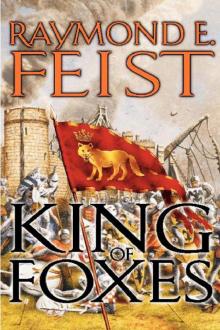 King of Foxes
King of Foxes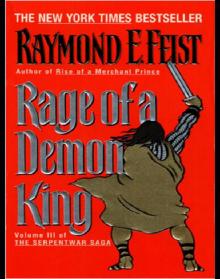 Rage of a Demon King
Rage of a Demon King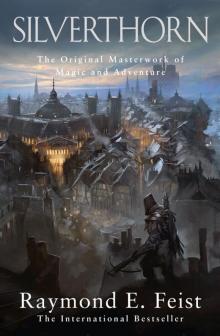 Silverthorn
Silverthorn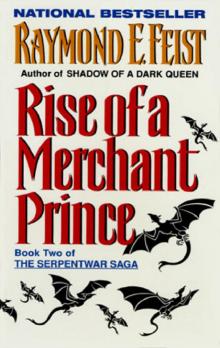 Rise of a Merchant Prince
Rise of a Merchant Prince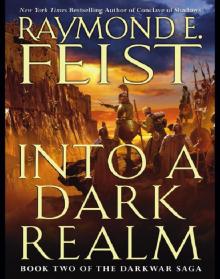 Into a Dark Realm: Book Two of the Darkwar Saga
Into a Dark Realm: Book Two of the Darkwar Saga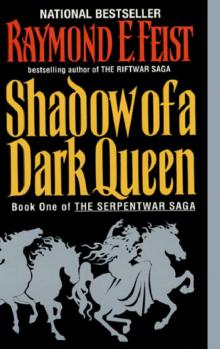 Shadow of a Dark Queen
Shadow of a Dark Queen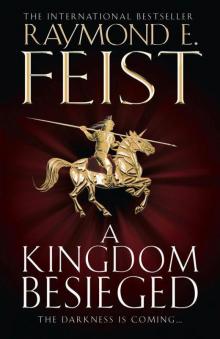 A Kingdom Besieged
A Kingdom Besieged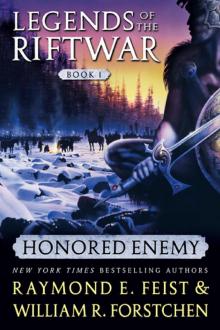 Honored Enemy
Honored Enemy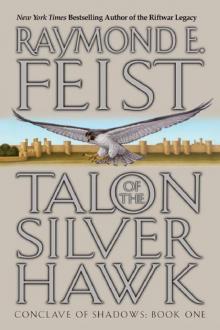 Talon of the Silver Hawk
Talon of the Silver Hawk The Complete Legends of the Riftwar Trilogy
The Complete Legends of the Riftwar Trilogy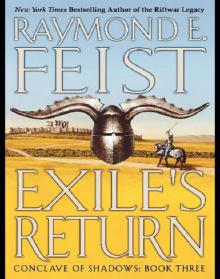 Exile's Return: Conclave of Shadows: Book Three
Exile's Return: Conclave of Shadows: Book Three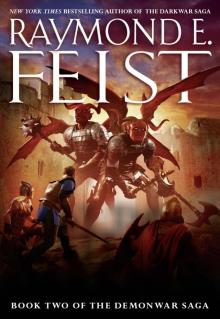 At the Gates of Darkness
At the Gates of Darkness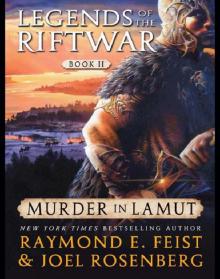 Murder in LaMut: Legends of the Riftwar: Book II
Murder in LaMut: Legends of the Riftwar: Book II The King's Buccaneer
The King's Buccaneer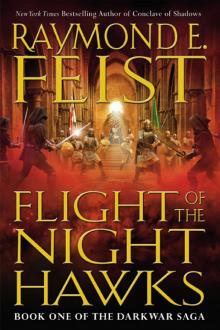 Flight of the Nighthawks
Flight of the Nighthawks The Riftwar Saga
The Riftwar Saga A Darkness at Sethanon
A Darkness at Sethanon Magician: Master
Magician: Master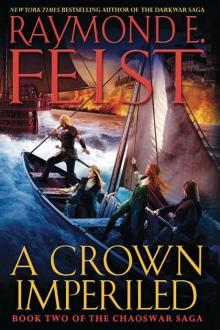 A Crown Imperiled
A Crown Imperiled Magician: Apprentice
Magician: Apprentice Midkemia
Midkemia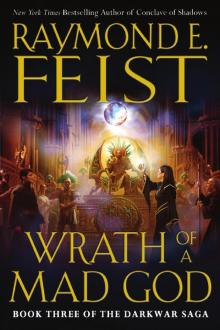 Wrath of a Mad God
Wrath of a Mad God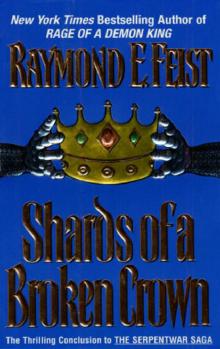 Shards of a Broken Crown
Shards of a Broken Crown Magician's End
Magician's End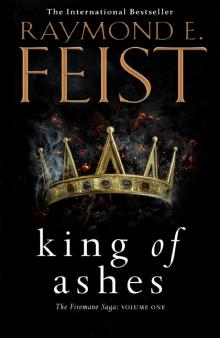 King of Ashes
King of Ashes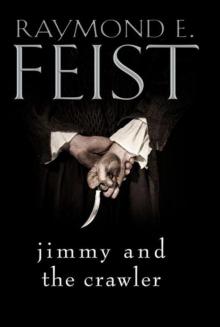 Jimmy and the Crawler
Jimmy and the Crawler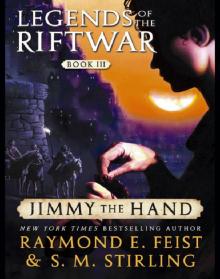 Jimmy the Hand: Legends of the Riftwar, Book 3
Jimmy the Hand: Legends of the Riftwar, Book 3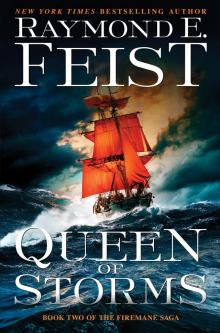 Queen of Storms
Queen of Storms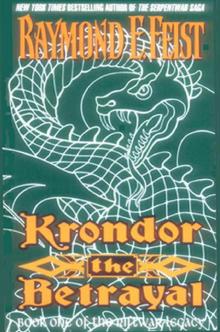 Krondor: The Betrayal
Krondor: The Betrayal Magician
Magician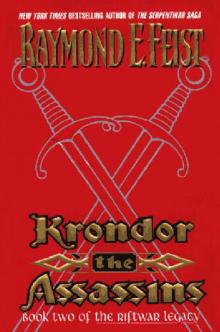 Krondor: The Assassins
Krondor: The Assassins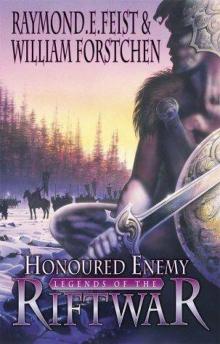 Honoured Enemy
Honoured Enemy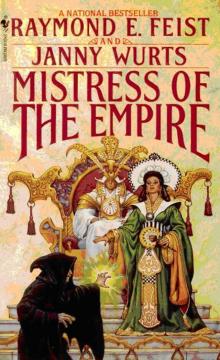 Mistress of the Empire
Mistress of the Empire The Complete Empire Trilogy
The Complete Empire Trilogy Legends 1 - Honoured Enemy
Legends 1 - Honoured Enemy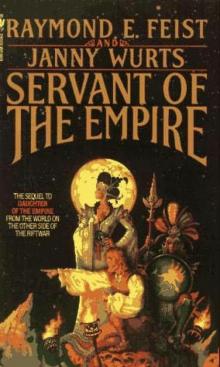 Empire - 02 - Servant Of The Empire
Empire - 02 - Servant Of The Empire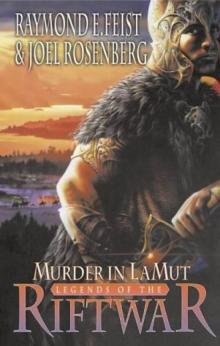 Murder In LaMut
Murder In LaMut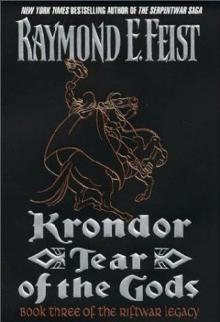 Krondor Tear of the Gods
Krondor Tear of the Gods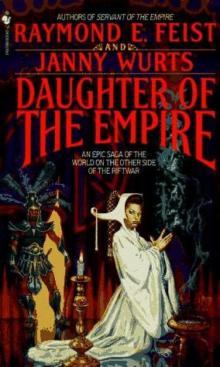 Empire - 01 - Daughter Of The Empire
Empire - 01 - Daughter Of The Empire![King of Ashes [Book One] Read online](http://i1.bookreadfree.com/i1/03/30/king_of_ashes_book_one_preview.jpg) King of Ashes [Book One]
King of Ashes [Book One]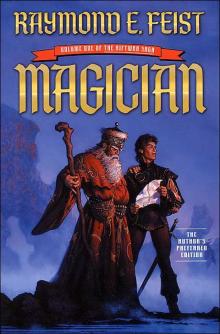 Magician (10th Aniversary Edition)
Magician (10th Aniversary Edition) Prince of the Blood, the King's Buccaneer
Prince of the Blood, the King's Buccaneer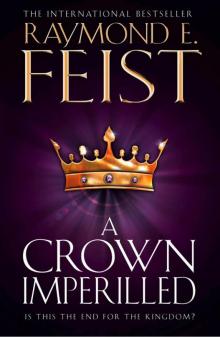 A Crown Imperilled cs-2
A Crown Imperilled cs-2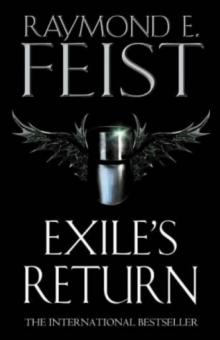 Exile's Return
Exile's Return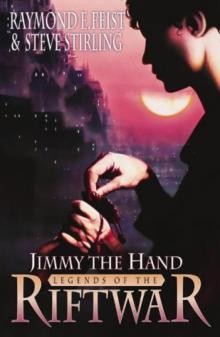 Jimmy the Hand
Jimmy the Hand Book 1 - Magician
Book 1 - Magician Empire - 03 - Mistress Of The Empire
Empire - 03 - Mistress Of The Empire Darkness at Sethanon
Darkness at Sethanon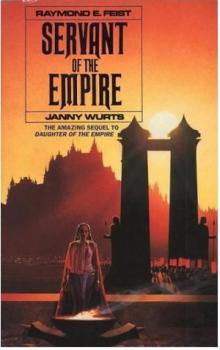 Servant of the Empire
Servant of the Empire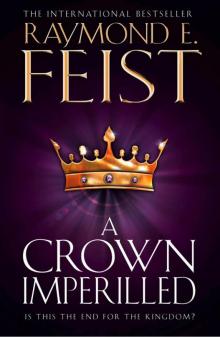 A Crown Imperilled
A Crown Imperilled Rides a Dread Legion
Rides a Dread Legion Legends of the Riftwar
Legends of the Riftwar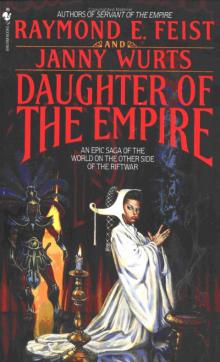 Daughter of the Empire
Daughter of the Empire The Riftwar Saga Trilogy: Magician, Silverthorn and A Darkness at Sethanon
The Riftwar Saga Trilogy: Magician, Silverthorn and A Darkness at Sethanon